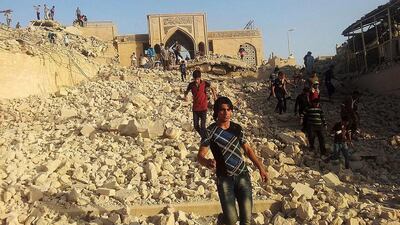Despair is haunting parts of the Arab world. The failure of the Arab revolutions and the ascendancy of civil and regional wars deprived the Arabs of one more precious icon of theirs: the revolution. For a long time, Arabs, rightly or wrongly, appropriated the term “revolution”. The military coups which took place in Egypt, Iraq, Syria, Yemen and Libya in the 1950s and 1960s called themselves revolutions. The Algerian revolution, which erupted in 1954 and the Palestinian one, which started in 1965, became two mainstays of the modern Arab historiography and self-pride.
In addition, the revolution, in its Arab connotation, became identical to salvation. The common wisdom which prevailed until a few years ago was that only revolutions can rid Arabs of their “eternal” regimes. Let’s not forget that the Baath Party ruled Syria from 1963 and the Assad dynasty came to power in 1970. In Iraq, the Baathists seized power in 1968. In Libya, Muammar Gaddafi founded his dictatorship in 1969.
The revolution, nowadays, has a negative meaning. Very few people want to associate with it. The great majorities in the Arab countries opt for safety before anything else. After the recent spectacle of blood and mass uprooting in the region, changing the political status quo is on nobody’s agenda.
Actually, all the other ideological and material pillars upon which Arab life rested for more than five decades fell apart. Some of them became nightmares; some became fantasies.
The idea of Arab unity, born in the 1920s as a great historic project to be achieved, started to lose its appeal in 1961, when Syria seceded from the briefly alive Arab United Republic, leaving Egypt under Gamal Abdel Nasser. Since the eruption of the Jordanian and Lebanese civil wars in 1970 and 1975, it became evident that preserving the unity of almost any Arab country could be a risky and unguaranteed business. This belief, with the disintegration of many Arab countries, has hardened into a truism.
Liberating Palestine, the slogan which was adopted by almost all Arabs after 1948 and especially after the military coups of the 1950s and 1960s, which sought to divert the attention of their citizens from their miserable situation, ceased to mean anything. Since 1967, with the defeat of Egypt, Syria and Jordan by Israel, the alternative slogan became "restoring the occupied Arab lands".
In the war of October 1973, Egypt and Syria were at their best and the limits of Arab military capacity were elaborately tested. Later on, in 1978 and 1979, Egypt signed its two peace agreements with Israel. The Palestinians themselves signed peace accords in 1993; the Jordanians followed in 1994. Since 2007, Palestinian nationhood has itself became partitioned between two competing political entities in the West Bank and Gaza Strip, each of which claims to represent the interests and rights of the Palestinian people as a whole.
Patriotism, as a modern political value and an antithesis of chauvinistic nationalism, shattered after ISIL managed to stifle the nation-state by amalgamating parts of Syria with parts of Iraq. On the other hand, the growing allegiance to Iran among Shia communities in many Arab countries and the rise of Kurdish separatism in Iraq and Syria accentuated this centrifugal tendency. The Christian calamities in Egypt, Syria and Iraq created a sense of detachment, which was compounded by waves of Christians emigrating to the West.
_________________________
Read more from Opinion:
Hassan Hassan: The deadly ISIL ambush in Kirkuk signifies the re-emergence of the terrorist group
_________________________
Even Arab authoritarianism is facing some challenges which were unthinkable six or seven years ago. With the growing influence and direct presence of Russia and some regional non-Arab powers (Iran, Turkey and Israel), any national sovereignty would be compromised and ultimately halved. Syria, in this regard, might offer the best illustration of such a process. It is extremely doubtful that Bashar Al Assad, even if he succeeded in putting an end to his opposition, can preserve his previous semi-totalitarian authority. Most probably he will end up a junior partner of many external, if not also internal, powers. The Iraqi, Libyan and Yemeni examples are not very different.
Islam needs greater protection. For many decades, it has been invoked to justify and legitimise too many political acts in this part of the world. The combination of long political despotism and mushrooming televangelism produced a flood of fatwas that caricatured religion and alienated different segments of believers. The election of Mohammed Morsi to the Egyptian presidency in 2012 showed profound unreadiness of political Islam to adapt to modern realities. More harm was done by ISIL, which tarnished the religion, not only in the Islamic world but also worldwide. For many, Islam became a synonym for pure violence coupled with grim fairytales.
Oil revenues which financed almost everything in the region since the 70s, lost most of their lure. They recreated the whole region on all levels and in different forms: from construction and infrastructure projects to education and mass media, and from bolstering conservative regimes to pampering many revolutions.
Nowadays, regardless of current fluctuations of prices, we might be undergoing the twilight of oil age.
This is the reason why many oil countries are trying to accelerate their efforts to diversify their sources away from oil.
Terror and the war on terror combined to create a terrifying solution to a terrifying problem. Cities like Mosul in Iraq and Aleppo in Syria have been razed. A sectarian sense of revenge is accompanying the victories over ISIL, which could reproduce itself under different names and slogans. The international indifference towards Arab suffering is adding insult to injury. This collapse of an entire way of life is not necessarily bad, provided something better looms on the horizon.
Hazem Saghieh is a political analyst and journalist

